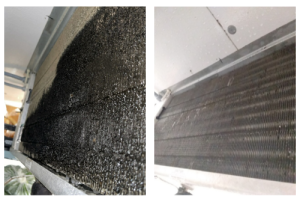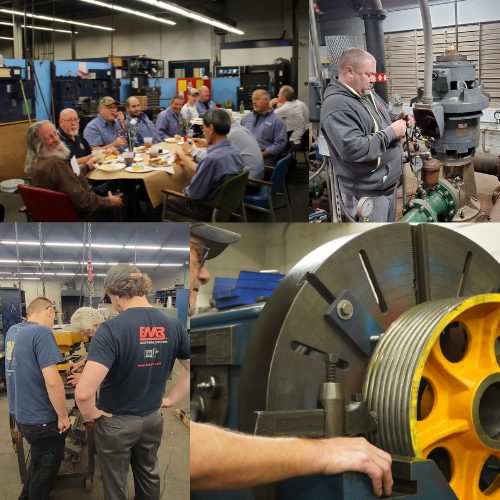Protect your investment – heatproof your kitchen for the Summer.
Essential maintenance tips for hot + cold commercial kitchen equipment.

Operating commercial kitchen equipment during the summer requires special attention to ensure efficiency, safety, and comfort due to the increased heat and humidity – outside AND in the kitchen itself! John Salemme, DCMV Account Manager with over 30 years of experience in the food service industry, shared a few common issues and strategies for managing them.
Refrigeration Equipment: Refrigerators, freezers, walk-in coolers, ice machines and more!
- Sealing and Insulation — Inspect the seals and gaskets on refrigeration units regularly and replace any that are damaged or worn. Proper seals are essential for maintaining cold temperatures and preventing warm air from entering the unit. Additionally, ensure that the insulation around refrigeration units is in good condition to minimize heat transfer.
- Regular Cleaning — Cleanliness is essential for ice machine maintenance, especially in hot weather when bacteria can proliferate more rapidly. Ice machines have an easily removable air filter that should be cleaned every month. Check the water filter to see when it was last changed (it should be every six months). Depending on your volume, the machine should be descaled and sanitized every 3 to 6 months. Please remember that ice is food!

Evaporator before & after cleaning
- Air Circulation — Ensure that there is adequate airflow around refrigeration units. Avoid placing units in areas where airflow is restricted or obstructed, as this can cause them to work harder and consume more energy. Additionally, keep vents and grilles clear of debris to allow for proper ventilation.
- Temperature Monitoring — You should have thermometers placed inside each refrigerator and freezer. Keep an eye on the actual temperatures when the hot weather starts. If you are seeing any changes in temperature outside of the norm, you might be able to catch an issue before it gets disastrous.
Cooking Equipment: Ovens, fryers, dishwashers, steamers, ranges, griddles and more!
- Ventilation — Ensure that an oven’s ventilation system is clean and unobstructed to prevent overheating and maintain proper airflow. Clean or replace ventilation filters as needed to ensure optimal performance. Never use the top of your convection oven like a shelf as it causes the oven to overheat and could cause electrical damage.
- Fryer Cleanliness — The buildup of grease, food particles, and other debris in a fryer can harbor harmful bacteria and pathogens, posing a serious risk of foodborne illness. Regular cleaning helps prevent contamination and ensures that the food prepared in the fryer is safe for consumption. Grease buildup in a fryer also poses a significant fire hazard. Aim to clean your fryer at least once a week, or more frequently if it is heavily used.
- Functioning Gaskets — Gaskets help to maintain temperature control, prevent leaks and contamination, reduce energy costs, and ensure safety and compliance. They can be found in dishwashers, blenders, ovens, steamers and more. Regular inspection and maintenance of gaskets are essential for optimizing the performance and longevity of commercial kitchen equipment.
- Filter Maintenance — Water filters are installed in steamers, combi ovens, coffee machines and more. They are designed to remove sediment, minerals, chlorine, and other impurities from water to improve taste, quality, and equipment performance. Regular replacement or maintenance is essential to prevent scale buildup, prolong equipment lifespan, and ensure consistent product quality.
By implementing these maintenance practices, commercial kitchens can minimize the impact of hot weather on equipment performance, reduce the risk of breakdowns or accidents, and maintain a safe and efficient working environment for staff. It’s also not a bad idea to consider a planned maintenance program if you don’t already have one in place. Protect your investment -your equipment will love you for it!




